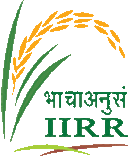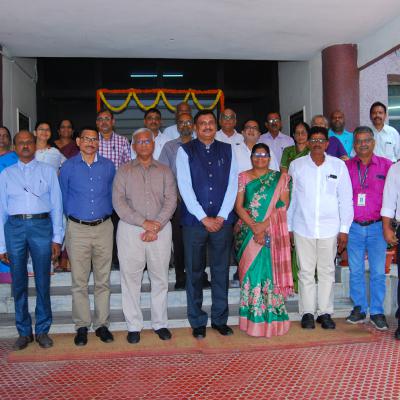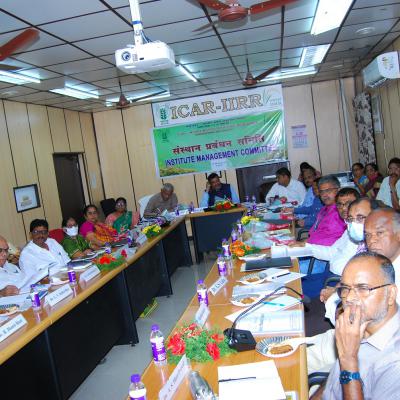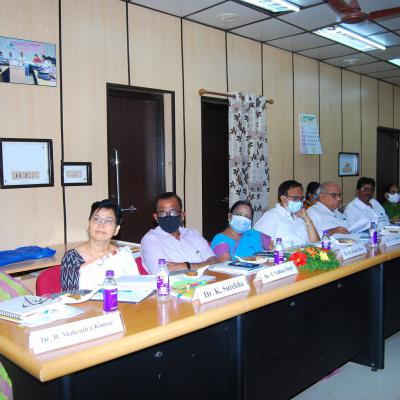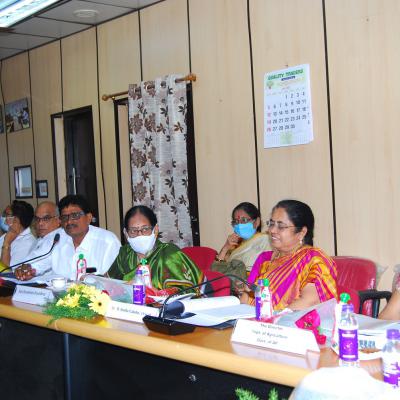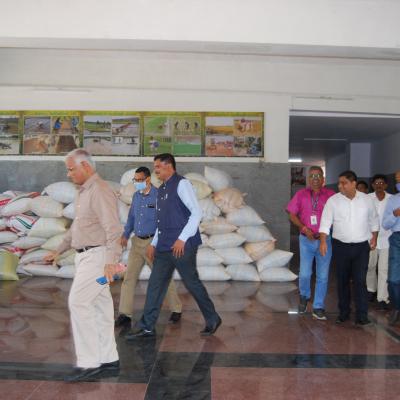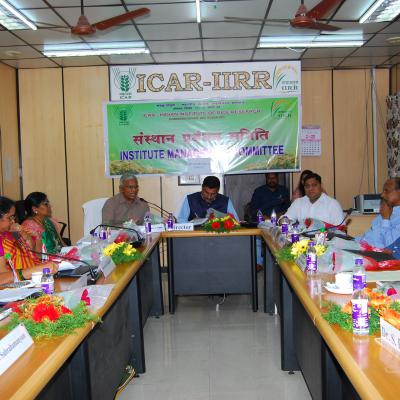
Dr. Satish N. Chavan, Senior Scientist(Nematology)
Name:- Dr. Satish Namdeo Chavan
Designation:- Senior Scientist (Nematology)
Email ID:- यह ईमेल पता spambots से संरक्षित किया जा रहा है. आप जावास्क्रिप्ट यह देखने के सक्षम होना चाहिए. (यह ईमेल पता spambots से संरक्षित किया जा रहा है. आप जावास्क्रिप्ट यह देखने के सक्षम होना चाहिए.)
Official phone number:- 040-24591239
Google scholar link:- https://scholar.google.com/citations?hl=en&user=lEmu-IAAAAAJ
Research gate link:- https://www.researchgate.net/profile/Satish-Chavan-4
ORCID link:- https://orcid.org/0000-0001-6183-4453
Educational Qualification:-
- UG: B.SC. Agriculture, VNMKV (Vasantrao Naik Marathwada Krishi Vidyapith), Parbhani, Maharashtra, 2011.
- PG: MSc in Nematology from ICAR-Indian Agricultural Research Institute, New Delhi in 2013.
- PhD: PhD in Bioscience Engineering, Agriculture from Ghent University, Belgium, 2023
Employment Record / Work Experience:- Scientist since 01/01/2015
Area research specialization:-Nematology, Nematode Management, Plant-nematode Interaction, Plant Resistance to nematodes, Induced Resistance in Rice
Important projects under taken:-
- Investigations on genetics and mechanisms of resistance to rice root-knot nematode Meloidogyne graminicola.
- Dehydroascorbate: a novel inducer of plant resistance in rice against root-knot nematode Meloidogyne graminicola.
- Studies on plant nematode interactions in diverse rice phytobiomes.
- Investigations on nematodes of importance to rice cultivation.
- Development of entomopathogenic nematodes (EPN) for biointensive integrated pest management in rice
Award and Honors:-
- Young Scientist Award 2023 from Plant Protection Association of India, Hyderabad 2023.
- Best Scientist Award 2023 from ICAR-Indian Institute of Rice Research, Hyderabad.
- Best Research Paper Award 2023 from ICAR-Indian Institute of Rice Research, Hyderabad.
- Award of Netaji Subhash ICAR International Fellowship 2019 for pursuing PhD at Ghent University, Belgium.
- Qualified for ICAR Senior Research Fellowship - 2014.
- Award of ICAR Junior Research Fellowship for pursuing M.Sc - 2011
Foreign Visits:-
Foreign visit for pursuing of PhD studies at Ghent University, Belgium under Netaji Subhash ICAR International Fellowship 2019-2023.
Technologies/Products/Varieties/Novel germplasm/Methodologies developed:-
Identified and developed induced resistance-stimulating compound dehydroascorbate in rice against root-knot nematode Meloidogyne graminicola
2. Studied detailed molecular and biochemical mechanisms underlying dehydroascorbate induced resistance and intergenerational acquired resistance in rice against root-knot nematode Meloidogyne graminicola
3. Studied and reported the role of rice diterpenoid phytoalexins in rice-nematode interaction and reported their importance in rice defence against phytoparasitic nematodes
4. Identified rice genotypes resistant to the root-knot nematode Meloidogyne graminicola
5. Identified plant essential oils and agrochemicals nematicidal to the rice root-knot nematode Meloidogyne graminicola
6. Isolated and identified new native entomopathogenic nematode (EPN) isolates and species from rice ecologies
7. Developed biocontrol technology for the management of insect pests of rice using entomopathogenic nematodes
Patents/copyrights:-
Student Guided:- Two MSc Students
Editors/Reviewers of the Journals:-
Reviewer for several Peer revived national and International Journals
Member of Scientific Society:-
1. Life member of Nematological Society of India
2. Life member of Society for the advancement of Rice Research
3. Life member of Plant Protection Association of India
Training Organized:-
Training Undergone:-
1. Attended a training Programme on “Bioinformatics Advances in Genomics Data Analysis” conducted by IASRI, New Delhi during 24-28 June, 2024.
2. Attended 21 day winter School on “Applications of Advanced Statistical Tools in Agricultural Research” held at the Department of Agricultural Statistics, COA, UAS, Dharwad during 8-28 November, 2016.
3. Attended 5 day training programme on “Analysis of Experimental Data using R” held at ICAR-NAARM, Hyderabad, during 21-26 February, 2019.
4. Attended three-month Professional Attachment Training, at Nematode Research Laboratory, Department of Zoology, Aligarh Muslim University, Aligarh, Uttar Pradesh from 25th May to 24th August, 2015.
5. Attended one day workshop on “Enabling IP Protection for Plant Varieties (Including Farmers Varieties) Through PPV and FRA’ held at ICAR-IIRR, Hyderabad on 22nd June 2016.
Publications (Top 30):-
Research papers
1. Chavan S.N., Tumpa F.H., Khokon M.A.R. and Kyndt T. (2023). Potential of exogenous treatment with dehydroascorbate to control root-knot nematode infection in rice. Rice, 16(1):29.
2. Chavan S.N. and Kyndt T. (2023). Meloidogyne graminicola - Parasite of the Month. Trends in Parasitology. 39(12): 1114-1115. https://doi.org/10.1016/j.pt.2023.08.010.
3. Somasekhar N. and Chavan S.N. (2024). Nematode biotic indices: advancements and applications in assessing soil health. Indian Journal of Nematology 53(Special Issue): 30-42.
4. Chavan S.N., De Kesel J., Desmedt W., Degroote E., Singh R.R., Nguyen G.T., Demeestere K., De Meyer T. and Kyndt T. 2022. Dehydroascorbate induces plant resistance in rice against root-knot nematode Meloidogyne graminicola. Molecular Plant Pathology, 29(3): 1303-1319.
5. Desmedt W., Kudjordjie E.N., Chavan S.N., Zhang J., Li R., Yang B., Nicolaisen M., Mori M., Peters R.J., Vanholme B., Vestergård M. and Kyndt T. (2022). Rice diterpenoid phytoalexins are involved in defence against parasitic nematodes and shape rhizosphere nematode communities. New Phytologist, 235(3): 1231-1245.
6. Desmedt, W., Kudjordjie, E. N., Chavan, S. N., Desmet, S., Nicolaisen, M., Vanholme, B., et al. (2022) Distinct chemical resistance-inducing stimuli result in common transcriptional, metabolic, and nematode community signatures in rice root and rhizosphere. Journal of Experimental Botany. 73(22): 7564-7581.
7. Thube H.S., Pandian R.T.P., Babu M., Josephrajkumar A., Mhatre P.H., Santhosh Kumar P., Nirmal Kumar B.J., Hegde V. and Chavan S.N. (2022). Evaluation of a native isolate of Metarhizium anisopliae (Metschn.) Sorokin TMBMA1 against tea mosquito bug, Helopeltis theivora infesting cocoa (Theobroma cacao L.). Biological Control 179: 1-9.
8. Mahboob M, Chavan S.N., Nazir N., Mustaqim M., Jahan R., Tahseen Q. (2021). Description of a new and two known species of the insect-associated genus Oigolaimella Paramonov, 1952 (Nematoda: Diplogastridae) with a note on the biology, biogeography and relationship with congeners. Zoologischer Anzeiger 295: 163-190.
9. Chavan S.N., Somasekhar N and Jhansi Rani B. (2019). Nematicidal activity of essential oils against rice root-knot nematode Meloidogyne graminicola. Indian Journal of Nematology 49(2): 139-145.
10. Chavan S.N. and Somasekhar N. (2019). Effect of agrochemicals used commonly in rice ecosystem on Meloidogyne graminicola. Pesticide Research Journal 31(2). 282-287.
11. Chavan S.N., Somasekhar N and Subbarao L.V. (2019). Reaction of rice cultivars to rice root-knot nematode Meloidogyne graminicola. Journal of Rice Research 12(2): 69-71.
12. Chavan S.N., Somasekhar N. and Katti G. (2018). Compatibility of entomopathogenic nematode Heterorhabditis indica (Nematoda: Heterorhabditidae) with agrochemicals used in the rice ecosystem. Journal of Entomology and Zoology Studies 6(4): 527-532.
13. Chavan S.N., Somasekhar N., Senguttuvel P., Chitra Shanker, Padmakumari A.P. and Katti G. (2018). Susceptibility of rice root aphid, Tetraneura nigriabdominalis (Sasaki) (Hemiptera: Aphididae) to EPN. Annals of Plant Protection Sciences 26(1): 229-230.
14. Mhatre P.H., Patil J., Vijay Kumar R., Venkatasalam E.P., Divya K.L., Jenifer J., Pankaj and Chavan S.N. (2017). The first report of Steinernema cholashanense (Rhabditida: Steinernematidae) from India. Indian Journal of Nematology 47(2): 254.
Book chapters
1. Mhatre P.H, Thorat Y.E, Manimaran B., Divya K.L, Bairwa A., Chavan S.N., Pokhare S.S, Dukare A.S., and Karthik C. (2024). Nematicidal activity of secondary metabolites from soil microbes. In: Sustainable Management of Nematodes in Agriculture, Vol.2: Role of Microbes-Assisted Strategies. (Eds. Chaudhary K.K., Meghvansi M.K., and Siddiqui S.). Springer Nature, Switzerland AG, pp. 297-326.
2. Chavan S.N., Somasekhar N., Thorat Y.E., Thube S.H., Bandeppa and Mhatre P.H. (2019). Entomopathogenic nematodes: a green strategy for management of insect pests of crops. In: Advances in Agricultural Entomology Volume IV. (Ed. Dr. Ghoneim K.). AkiNik Publications, New Delhi, India, PP. 127-157.
3. Bandeppa, Gobinath R., Latha P.C., Manasa V., and Chavan S.N. (2019). Soil ecological pros and cons of nanomaterials: Impact on microorganisms and soil health. In: Nanotechnology for agriculture: advances for sustainable agriculture. (Eds. Panpatte D.G. and Jhala Y.K.). Springer Nature, Singapore, pp. 145-160.
4. Somasekhar N., Chavan S.N., Prasad J.S. (2019). Biologically based approaches for management of nematode pests of rice. In: Biointensive approaches: application and effectiveness in the management of plant nematodes, insects and weeds. (Eds. Khan M.R., Mukhopadhyay A.N., Pandey R.N., Thakur M.P., Singh Dinesh, Siddiqui M.A., Mohiddin F.A., Haque Ziaul). Indian Phytopathological Society, New Delhi, India, pp. 145-169.
Popular articles
1. Chavan S.N., Somasekhar N., Tumpa F.H. and Tina Kyndt (2023). Dehydroascorbate: a novel induced resistance stimulating compound in rice against root-knot nematode Meloidogyne graminicola. IIRR Newsletter 21(2).
2. Somasekhar N. and Chavan S.N. (2023). Rice root-knot nematode Meloidogyne graminicola - an emerging threat to rice cultivation. IIRR Newsletter 21(1).
3. Chavan S.N., Somasekhar N, Bandeppa, Mahesh Kumar and Mhatre P.H. (2020). Integrated Nematode Management (in Hindi). Kheti, September 2020: 33-35.
4. Chavan S.N., Somasekhar N., Sridhar Y. and Katti G. (2019). Pathogenicity of entomopathogenic nematodes to rice swarming caterpillar Spodoptera mauritia. IIRR Newsletter 17(1): 4-5.
5. Somasekhar N. and Chavan S.N. (2016). Nematode problems in rice and integrated management approaches (in Telugu). In: Modern technologies for achieving higher yields in rice (in Telugu), Technical Bulletin No. 94/2016, IIRR, Hyderabad, pp. 56-59.
6. Chavan Satish, Somasekhar N. and Mhatre Priyank (2017). Plant parasitic nematodes and their management (in Marathi). Krushiking 4: 31-32.
7. Chavan S. N., Somasekhar N. and Gayatri B. (2016). Nematode pest management in oilseed crops. In: Training manual on plant health management for increasing oilseeds production, P. Duraimurugan, M. S. Lakshmi Prasad, P. S. Srinivas, Md. A. Aziz Qureshi, M. Padmaiah, A. V. Reddy (Eds.), ICAR-Indian Institute of Oilseeds Research, Hyderabad, India. pp. 175-178.
E - Publications
1. Manimaran B., Ramya R.S., Mhatre P.H., Tadigiri S., Chavan S.N. and Thorat Y. (2019). Fungal secondary metabolites: The potential eco-safe pesticides for plant protection. Biomolecules report. BR/11/19/01: 1-10.
2. Sirisha T., Kesava Kumar, Chavan S.N., Thorat Y.E., Manimaran B. and Mhatre P.H. (2019). Nematode barcoding and its utility in taxonomy and quarantine significance. Biomolecule Report. BR/10/19/05: 1-9.
3. Thorat Y.E., Borase D.N., Holkar S.K., Chavan S.N. Manimanran B., Sirisha T and Mhatre P.H. (2019). The nematodes: From the vistas of climate change. Vikaspedia: 16.11.2019.
4. Mhatre P.H., Chavan S.N., Divya K.L., Thorat Y.E., Ventakatasalam E.P., Arti B., Sirisha T. and Manimaran B. (2019). Biological control of plant parasitic nematodes (in Hindi). Krishiseva: 20.11.2019.
5. Chavan S.N., Somasekhar N., Thorat Y., Manimaran B., Pankaj, Tadigiri S. and Mhatre P.H. (2018). Nematode suppressive crops: A promising approach for nematode management. Biomolecule Reports. BR/12/18/05: 1-8.
6. Chavan S.N., Somasekhar N., Madhav M.S., Kalyani B.M., Suneel B. and Sivakrishna K. (2018). Heterorhabditis indica isolate IIRRHI1 internal transcribed spacer 1, partial sequence; 5.8S ribosomal RNA gene, complete sequence; and internal transcribed spacer 2, partial sequence. NCBI GenBank: Accession No: MH368498, MH379674, MH388300 and MH392568.
7. Askary T.H., Somasekhar N., Chavan S.N., Jamal Ahmad M. and Sheshumadhav M. (2018). Steinernema cholashanense isolate INDK1 internal transcribed spacer 1, partial sequence; 5.8S ribosomal RNA gene, complete sequence; and internal transcribed spacer 2, partial sequence. NCBI Gene Bank Accession Number: MH128155.1.
8. Somasekhar N., Sunanda B.S., Sivakrishna K., Chavan S.N., Prasad J.S., Qudsia T., Padmakumari A.P. and Katti G. (2016). Achromobacter insolitus strain Ma1Bc 16S ribosomal RNA gene, partial sequence. NCBI GenBank: Accession No: KY000495.1
9. Sunanda S.B., Somasekhar N., Sivakrishna K. and Satish C.N. (2016). Photorhabdus luminescens subsp. akhurstii strain HiB2N 16S ribosomal RNA gene, partial sequence. NCBI Gene Bank Accession Number: KX022122.1
Conference abstracts
1. Chavan S.N., Stojilkovic Boris and Kyndt Tina (2023). The role of nitric oxide in rice resilience to root-knot nematode Meloidogyne graminicola. Abstract book of the ‘International Conference on Plant Health Management ICPHM 2023: Innovation and Sustainability held at Hyderabad, from 15-18 November, 2023, PP 125-126.
2. Somasekhar N., Shiva Krishna K., Senguttuvel P. and Chavan S. N. (2023). Host Response and genetics of resistance to rice root-knot nematode Meloidogyne graminicola in Asian Rice (Oryza sativa L) cultivar Khao Pahk Maw. Abstract book of the ‘International Conference on Plant Health Management ICPHM 2023: Innovation and Sustainability held at Hyderabad, from 15-18 November, 2023, PP 239-240.
3. De Kock K., Chavan S.N., Degroote E. and Kyndt T. (2023). Dehydroascorbic acid provides intergenerational acquired resistance in rice against the root-knot nematode Meloidogyne graminicola. Presented at International Society for Molecular Plant-Microbe Interactions (IS-MPMI) congress - 2023 held at Rhode Island, USA, during July 16–20, 2023.
4. Kyndt T., Chavan S.N., Tumpa F.H., De Kock K and Degroote E. (2023). Dehydroascorbate induces resistance against root-knot nematodes in the same and a subsequent rice generation. Presented at 12th International Congress of Plant Pathology, held at Lyon, France during august 20-25, 2023, pp. 1213.
5. Chavan S.N., De Kesel J., Desmedt W., Degroote E., Singh R.R., Nguyen G.T., Demeestere K., De Meyer T. and Kyndt T. (2022) Dehydroascorbate activates induced resistance in rice against root-knot nematode Meloidogyne graminicola, Abstract of 7th International Congress of Nematology (ICN 2022), Antibes Juan-Les-Pins, France held during 1 to 6 May 2022, pp 86.
6. Somasekhar, N., Subba Rao, L. V., Sivakrishna, K. and Chavan, S. N .2021. Screening of rice germplasm for resistance to rice root-knot nematode Meloidogyne graminicola. Abstracts of National seminar on the “Facets of Innovation and Development of Plant Nematology” Nematological Society of India, New Delhi. October 29-30, 2021. Pp. 21.
7. Somasekhar N., Sivakrishna K and Chavan S.N. (2019). A rapid in-vitro screening method for resistance to rice root-knot nematode Meloidogyne graminicola. Abstracts of XIX International Plant Protection Congress (IPPC)-2019, organized by ICRISAT at Hyderabad, India during Nov10-14, 2019. pp. 317.
8. Chavan S.N, Somasekhar N., Padmakumari A.P. and Katti G (2018). Tolerance of entomopathogenic nematode Heterorhabditis indica (Nematoda: Heterorhabditidae) to agrochemicals used in the rice ecosystem. Presented in international symposium on ‘Frontiers of Rice research for improving productivity, profitability and climate resilience” at Cuttack, India, February 6-9, 2018.
9. Somasekhar, N., Sivakrishna K., Chavan S.N., Prasad J.S., Tahseen Q., Madhav M.S.,Neeraja C.N., Padmakumari A.P. and Katti G. (2015). Isolation, Identification and Molecular Characterization of an Entomopathogenic Nematode (Metarhabditis amsactae) Pathogenic to Rice Pests, presented in International symposium on “Rice science for global food and nutritional security” at Rajendranagar, Hyderabad, Nov. 18-20, 2015.
Any other Information:-
